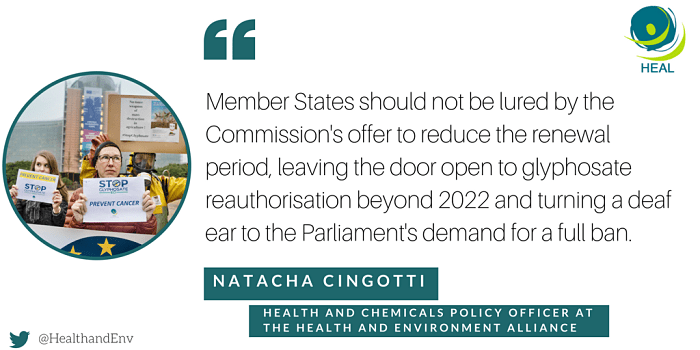Press note: The Forever Lobbying Project investigation finds that the clean-up of per- and polyfluoroalkyl substances (PFAS) contamination in Europe could cost 100 billion euros annually. Health-related costs for PFAS exposure are estimated to reach up to 84 billion euros annually. With these revelations, combined with the mounting scientific evidence on PFAS’ grave health impacts, it is clear that the European Commission must ensure a robust EU-wide PFAS restriction and come up with a plan to address these costs as part of the Clean Industrial Deal.
25 October 2017, Brussels – Representatives of the 28 European Member States failed to reach an agreement on the proposed European Commission reauthorisation of glyphosate today (1).
Following the European Parliament’s adoption of a resolution asking for a full phase out of glyphosate by 2022 with no extension yesterday (2), the European Commission announced that it would reopen discussions on the terms of its proposal. An earlier document originally proposed a reauthorisation period of 10 years (3).
Commenting on the meeting, Natacha Cingotti, Health and Chemicals Policy Officer at the Health and Environment Alliance (HEAL) said:
“Member States should not be lured by the Commission’s offer to reduce the renewal period, which leaves the door fully open for a reauthorisation of glyphosate beyond 2022 and turns a deaf ear to the European Parliament’s demand for a full ban without any extension.”
“The science is clear about glyphosate’s numerous adverse effects on health and the environment, and the public all around Europe is asking for a glyphosate-free future. Safe and viable sustainable alternatives exist; politicians have the responsibility to agree on a full ban as soon as possible.”
Ahead of today’s meeting, HEAL together with the Association of European Cancer Leagues (ECL) urged EU ministers to reject the European Commission proposal on glyphosate (4). Adding to the 1.3 million signatures collected by the European Citizens’ Initiative to Stop Glyphosate (5), a poll released this week shows solid citizens’ support for a complete and outright ban of the world’s most-sold herbicide (6).



